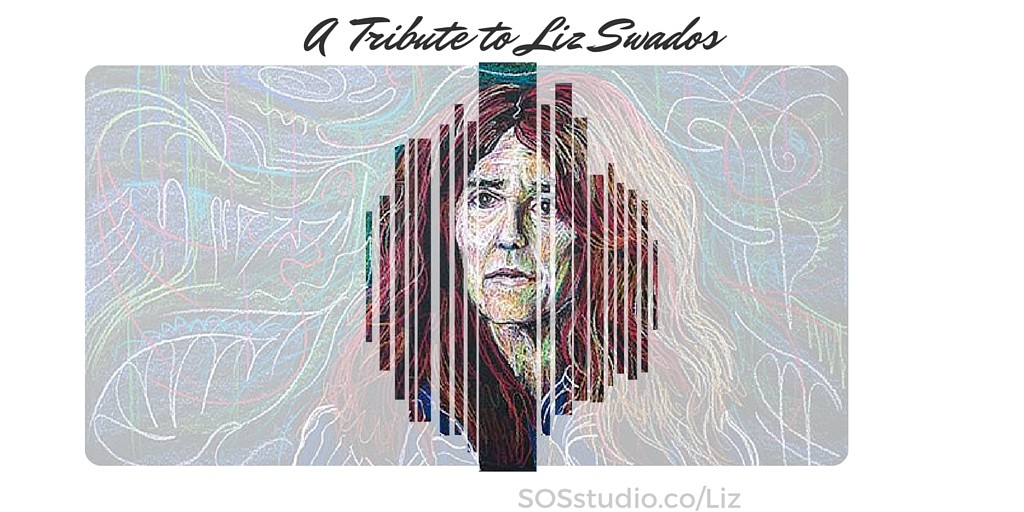
[powerpress]
On January 5th, 2016, the world lost Liz Swados. If you search for her name, you’ll find broadway credits, Tony nominations, and dozens of projects she developed… but you’ll have to dig harder to find stories of how she created. It was about looking at your creative endeavors and feeling a part of a community. About showing everything you have to offer and not putting up a wall in return. And about focusing on the strength of others and using your art to save someone’s life.
Tweet This:
A tribute to composer, music director, and theatre maker Elizabeth Swados. Click To Tweet
Meet The Players:
-
Joanna Shaw Flamm (Brooklyn) Actor, Writer, Comedienne, Teacher, and Podcast host at JustOneMorePodcast.com
-
Jabari Brisport (Brooklyn) Actor, Teacher, Vegan
-
Emma Tattenbaum-Fine (East Harlem) Actor, Creator/Writer Person, Working on a TV Pilot
-
Preston Martin (Brooklyn) Actor, Current Director for The Reality Show
- nicHi Douglas (Brooklyn) Actor, Dancer, Theater Maker, Writer, Working a lot with children
-
Julie Woods-Robinson (Orlando) Actor, Director, MFA Candidate in Theatre for Young Audiences at UCF, Theatre Educator
About The Reality Show
-
Originally conceived and directed by Liz, The Reality Show is an hour long musical sketch comedy show for incoming freshman at New York University. Written by students for students, it covers a wide range of topics such as sex, drugs, alcohol, and mental health (depression, suicide, cutting). The goal is to help others communicate what they have a hard time communicating. The acting, dancing, music, and singing are as impressive as possible.
Knowledge from Liz (Liz-isms) and Our Guests
-
So much about being a creative person is saying yes to yourself – Joanna
-
A true theatre maker will say “I’m going to take an interest in you because I see a spark in you that I want to pull out.” – Joanna
-
With Liz, once you were in her circle, it was harder to get out than to stay in. – Jordan
-
Liz could know things about you that you might not know about yourself at the time. – Julie
-
When you’re a ham or feeling bored, return to how you felt when you first wrote a piece. It’s that moment in the shower (or on the toilet) when you just HAD to write it down. Return to that moment. – Emma
-
One of Liz’s key strengths was teaching theatre makers to find what you’re passionate about, and write about it. – nicHi
-
Liz also had a knack to teach with both words AND silence. – nicHi
-
Liz’s work involved all of the faculties you have to bring to the table. She demanded the very best of your acting, singing, and moving. – nicHi
-
Show, don’t tell. Don’t talk about a good idea. Instead, see it through to completion and then share it. – Jordan
-
Get rid of the brain and let the full presence of self take over. The true artist will take over and show you what it wants you to do. – Preston
-
Tok (spelling?) – means “purpose and intention.” Bring it to everything you do. Infuse the work with every fiber of your being. – Jabari
-
Liz had a strategy to ask the cast to mutually tear it apart and start over midway through the process. – Jordan
-
As a teacher or collaborator, be a friend but don’t let others rest. Continue challenging them and yourself. – Emma
-
Even if you don’t understand the instruction, take it anyway. Ignore the intellect and follow it fully to see where it goes. Say “I don’t know where you’re going with this but I trust that you know where it needs to go.” – Joanna
-
Put away the part of it that is just performance, show-offy, not sincere. Throw away your ‘acting.’ It’s not useful. Who you are is enough and it doesn’t have to be polished. – Joanna
-
Diction and consonants. Emotionally, it goes beyond being heard and into communicating and reaching your audience. You want the audience to understand and you want to communicate. – Emma
-
You have an emotional investment as the performer because you care about the story. Share it with the same passion. – Julie
-
If I can’t hear your words, I don’t know what you’re talking about. Liz made Tok and diction into a higher realm and spiritual. ‘Words are our weapons of love.’ – Preston
-
Liz had ways of conveying lots of things at a higher level without having to justify anything. Rather than teaching about diction, she’d say ‘pronounce the F*** out of that word’ and you’d want to do it. – Joanna
-
Creativity- what you create doesn’t have to make sense. Create what you have to create to form that communicate. Create the sense that you are the only person in the universe who can be doing THIS right now. – Jordan
-
Liz would always go first. Her example set a high bar of wild abandon. It was all body and teeth. And you have no choice but to give it back exactly as she gave it to you. It’s not telling, it’s showing. – Preston
-
It’s never about us, about the actors in the room. Focusing on another person opens up the creative channels. Judgements and self-criticism are off. – Jabari
-
The good of the show vs your ego. Kill your darlings. You have to kill your best work if it’s not right for the show. That was true for what Liz wrote and true for what we wrote. Frees up your work because you don’t have to worry whether or not it’s going to make it. – Joanna
-
In The Reality Show, the stakes are high, it is to save a life of someone in the audience. And you can bring that into any bubble-gum production you’re working on. When you get out there on stage, your number one goal is to save a person’s life. – Preston
-
Impossible goals. Set something that you know you’ll never achieve and you will continue to fight to achieve it. – Jordan
-
You may feel like you’re working hard enough, but set an impossible goal and you will up your ‘working enough’ game. – Preston
-
When hearing something for the first time and deciding if it should be used in the show, Liz would default to 3 options: She’d either say “Yes” (with these tweaks), “No” (and here’s why), or (if she didn’t know or wanted to say ‘no’ without hurting your feelings) she’d say “I Need to Hear It Again.” – Jordan
-
Liz had that vulnerability with the cast that she could immediately hear something and share suggestions or say yes/no while strengthening the cast and guiding all toward the larger picture. – Jordan
-
Feedback is never personal, it’s always about the show. Liz had a way of saying “This does not work and yet you need to continue exploring it.” – Preston
-
Punctuality: Jabari showed up at 9:58 for a 10am rehearsal (first day) and she looked at him and said “Not a Good Start.” – Jabari
-
“When you’re late, what you’re telling the other people is that your time is more valuable than theirs.” – Joanna
-
Liz was at a place in her art where she didn’t waste time. She didn’t worry, she didn’t coddle, she was efficient from the heart. – Julie
-
The communities that Liz formed are valuable to the individual tribe members. She was instrumental in forming these communities but then she could also step out of the way. We have each met all of these people are caring, smart, and creative and these circles are all credited back to Liz. Those dynamic creative connections are so important and the circles of people you find throughout your creative life are so valuable. – Joanna
Join a community of songwriters helping each other reach their goals.
Thanks for Listening!
Thank you so much for tuning in to our conversation about Liz. While she would have hated that it was done on Skype, she would have loved the conversation.
If you enjoyed this episode, please share it using the social media buttons you see at the bottom of the post.
Also, please leave an honest review for SOSstudio Session on iTunes! Ratings and reviews are extremely helpful and greatly appreciated! They do matter in the rankings of the show, and I read each and every one of them.
And finally, don’t forget to subscribe to the show on iTunes to get automatic updates, or visit ourpodcast download page! It’s free!
Thanks again for joining! Until next time!
![]()
